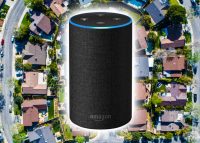SmartRent, a startup that develops “smart home” hardware and software for rental apartments, has raised $60 million to bulk up its offerings.
Tapping into demand for contact-free services, the company will use the fresh round of capital to add new products and grow its engineering and sales teams, co-founder and CEO Lucas Haldeman said. The Series C was led by Spark Capital, with participation from Fifth Wall, Energy Impact Partners, the Amazon Alexa Fund, Bain Capital Ventures and RET Ventures.
Founded in 2017, SmartRent has now raised more than $100 million to compete against companies like Latchable, the maker of Latch, and Google Nest. Haldeman, a former chief technology officer at Colony Starwood Homes, said SmartRent’s co-founders all came from real estate backgrounds and realized the proliferation of smart-home tools had been slow to reach the multifamily market.
“I had a bunch in my house, but no one had said, ‘Well, how do I control 40,000 or 1 million smart thermostats,’” he said. “So that’s what we built.”
Read more


SmartRent’s platform gives both landlords and renters access to digital locks, lights and thermostats. When units are occupied, tenants are fully in control. Landlords have digital control over vacant apartments. As such, SmartRent landlords can offer prospective tenants self-guided tours.
The startup also recently launched a tool to allow building, garage and elevator access — something to help multi-family operators manage a high volume of package deliveries.
According to Haldeman, SmartRent closed the round in mid-March. But he acknowledged the coronavirus pandemic has been a catalyst for increased demand. “We’ve seen this incredible groundswell,” he said.
Investors are also heartened by a shifting mindset in real estate. “The tailwinds of e-commerce, food and grocery delivery, and the broader digital economy were already significant entering 2020,” Will Reed, general partner at Spark Capital, said in a statement. “That demand has only accelerated as property owners and operators look for ways to make property tours contactless and handle deliveries in a seamless manner.”
Based in Scottsdale, Arizona, SmartRent currently employs 230 staffers, including 35 engineers. Haldeman said by the end of the year, he hopes to double the number of engineers and sales people. “We’ll be responsible in how we grow,” he said. SmartRent recently hired Darian Hong as chief financial officer and CJ Edmonds as chief revenue officer.
Haldeman declined to disclose the company’s revenue but said it’s on track to double in 2020. SmartRent is in 95,000 units, with almost 500,000 units in the pipeline.
“We’re getting to a pathway where we’re break-even,” said Haldeman, who attributed the massive backlog to two (unnamed) REITs that signed up to install SmartRent in buildings nationwide. To service those clients, SmartRent built out a national infrastructure that it has used to go after additional business nationwide.
For some of the biggest landlords, smart-home tools like access to heating and cooling, and water detection, promise to help reduce operating costs. In addition to buy-in from institutional clients, Fifth Wall partner Vik Chawla said SmartRent’s standout feature is an ability to shift control from renters to landlords and back, depending on whether the unit is occupied. “People have a very digital life as it relates to consumer purchases. The idea that they come home and have an analog experience, I don’t think will persist,” he said. “The trend toward digital experiences has only been accelerated as people sit at home.”
